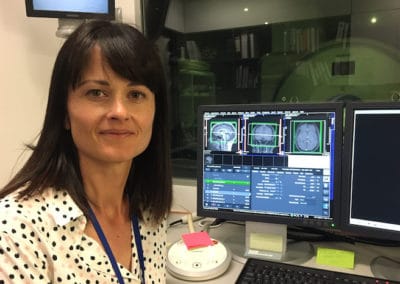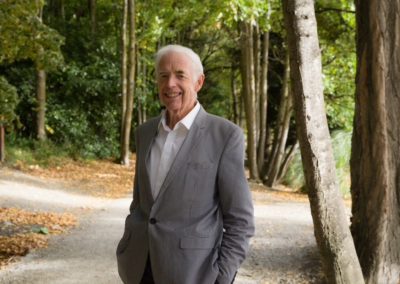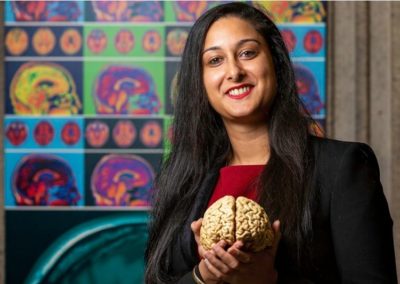This article was originally posted by the BHRC [http://www.otago.ac.nz/bhrc/news/otago654959.html]
Do you remember what you had for dinner last night? Think of the taste of it, the smell, remember the sounds around you while you ate. Congratulations, you’re a time traveller. When you remember an event your brain can’t replay it exactly as it was, instead it recreates it all. It pulls the sound from your auditory cortex, the images from your visual cortex, the feeling of it all from your limbic system. All the information of a memory is stored separately, but when you remember it you bring it all back together to form a whole. From your brain’s perspective you experience it all over again, and in a way you travel back through time. It’s an incredible feat, but why is your brain wasting resources storing all this information separately if it just wants to remember that event as a whole? “If this system was just for remembering things,” says Professor Donna Rose Addis during her public lecture, “surely it’d make more sense to have all the information locked down in one place, so there must be a reason why we break memories up into pieces.” That reason is imagination.
It turns out that imagining and remembering activate all the same areas of your brain. Just as memories pull their features from different areas, so too do imagined events. We take pieces of experiences, old and new memories, and stitch them together to form something completely new. This helps us to plan, to problem solve, to aspire toward new goals. We are doing this constantly. In fact at least 50% of our time is spent mind-wandering, and 50% of that is remembering the past or imagining the future. It is such a consistent behaviour that fMRI researchers originally thought it was the normal pattern of brain activation at rest.
“There is a classical pattern of activity that you see in the brain when people aren’t engaging with anything else,” Donna Rose says, “it’s not a random pattern, you see it in everyone. We call it the default mode network.” This network of brain structures become more active when there is nothing to grab our attention, when our minds wander. “What’s interesting,” Donna Rose says, “is that when we looked at this pattern, we recognised it as being basically the same as the memory retrieval network.” It’s an instinctive process, so much so that it takes up hours of our day. “The world is becoming increasingly obsessed with productivity and mindfulness, and so mind-wandering can seem like it stifles progress,” Donna Rose says, “but it is a hugely important part of our functioning.”
Simulating the future can significantly impact your performance, your preparedness, and your levels of anxiety. Some simulations, however, are more helpful than others. “Process simulations,” Donna Rose stresses, “appear to be much more helpful than outcome simulations.” Process simulations are exactly what they sound like: imagining the process of getting from point A to point B in order to achieve a goal. Outcome simulations instead have a focus on that end goal, without the planning of how to get there. In an experiment on students preparing for exams researchers were able to show that having the students engage in process simulations could reliably increase their grade. The study had to be discontinued, however, as the students who were told to focus on outcome simulations had a clear and consistent drop in their grades. Imagining is clearly a powerful mental tool, but as it is so closely linked to memory, what happens to it as we age?
The default mode network includes at least 11 brain regions, but one of the most important for memory and imagining is the hippocampus. You may have heard of the hippocampus before. It is the region of the brain we associate most with memory and it is a region which is greatly affected in both healthy and unhealthy ageing. “Unfortunately for me,” Donna Rose tells the crowd, “I’m just about to turn 40, which is the age where the hippocampus really starts to go downhill.” Over time, even in healthy adults, the hippocampus shrinks. By the time you are in your 80s your hippocampus will be at least 30% smaller than it was in your 30s. For those with dementia this process happens much faster. But what happens to your memories and imagination when your hippocampus shrinks?
In younger adults the hippocampus activates strongly during remembering, but it activates even more strongly for imagining. It works as a kind of novelty detector, sending out a strong signal when it’s told to retrieve information it has never put together before. “We tested this by getting people to imagine [unlikely] events,” Donna Rose says, “they’re randomly generated, and one of the weirdest ones we had was having someone imagine an event with their dad, in a laser tag park, with an inflatable boat.” It’s these absurd situations which really make the hippocampus light up, and the more detail they have the stronger the effect. The more often you imagine, or remember an event, the weaker the activation becomes. The hippocampus loses interest. But what does this have to do with ageing? “It’s not just the size of the hippocampus that changes as we get older, the activation changes too,” Donna Rose tells the crowd, “you stop seeing that differentiation between imagination and memory.” The imaginings and memories also change, “you lose many of the sensory details,” Donna Rose says, “the parts which make those situations seem concrete.”
The interesting part is that other areas of the brain seem to start picking up the slack. “We start seeing activation of other networks when older people are describing their events,” Donna Rose says, “the area with the most activation is called the temporal pole, and it’s usually associated with autobiographical facts.” This difference in activation patterns would account for the differences in the way older people describe memories and imaginings. “They tend to give a lot more non-episodic information, and flesh things out by giving a lot of background context and facts, rather than sensory details comprising the experience itself,” Donna Rose says, a change which makes sense if they’re coming from a more factual and autobiographical standpoint.
It’s not just the ageing brain that tries to retain memory and imagination, but the disordered brain as well. Depression, for example, also causes the hippocampus to shrink. The exposure of the hippocampus to stress hormones for an extended period of time eventually causes this shrinkage, and the effect is retained even after the depression has lifted. The brain, however, tries to adapt. “Again you see this lack of difference in brain activity between imagined events and memories,” Donna Rose says, “but you start to see activation in another system called the dorsal attention network.”
No matter what is thrown at it, the mind keeps finding ways to wander. It’s no wonder, then, that we spend so much of our time remembering and imagining, it’s what our brains want to do. So stop feeling guilty when you find yourself zoning out. Imagining isn’t the enemy of productivity, it is its silent, but persistent, companion.



